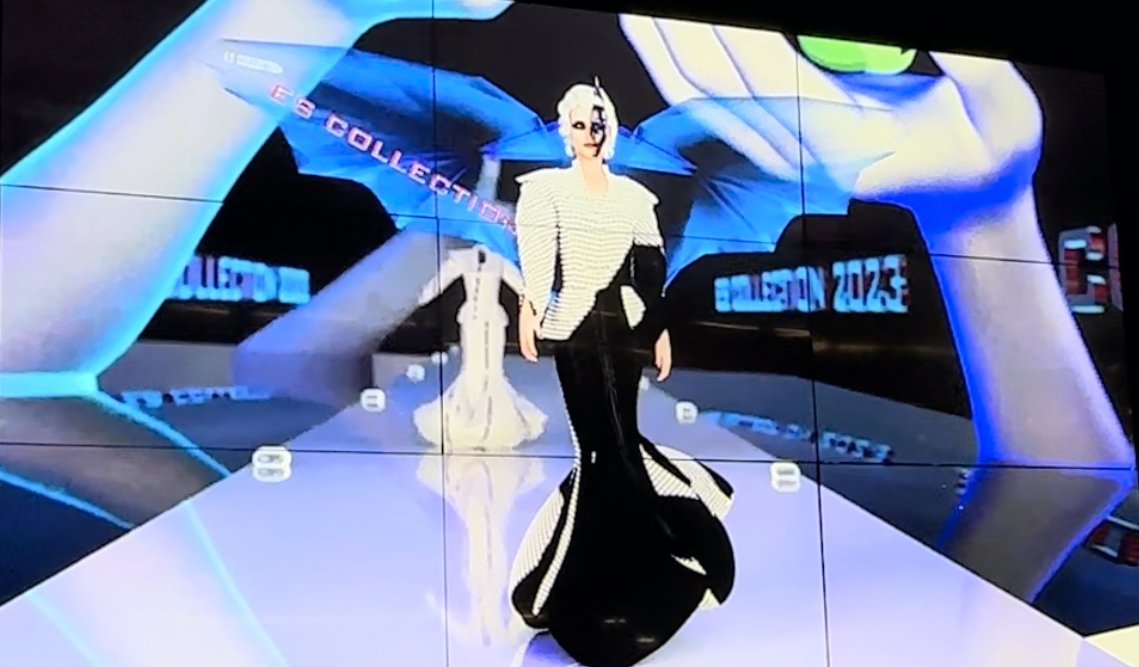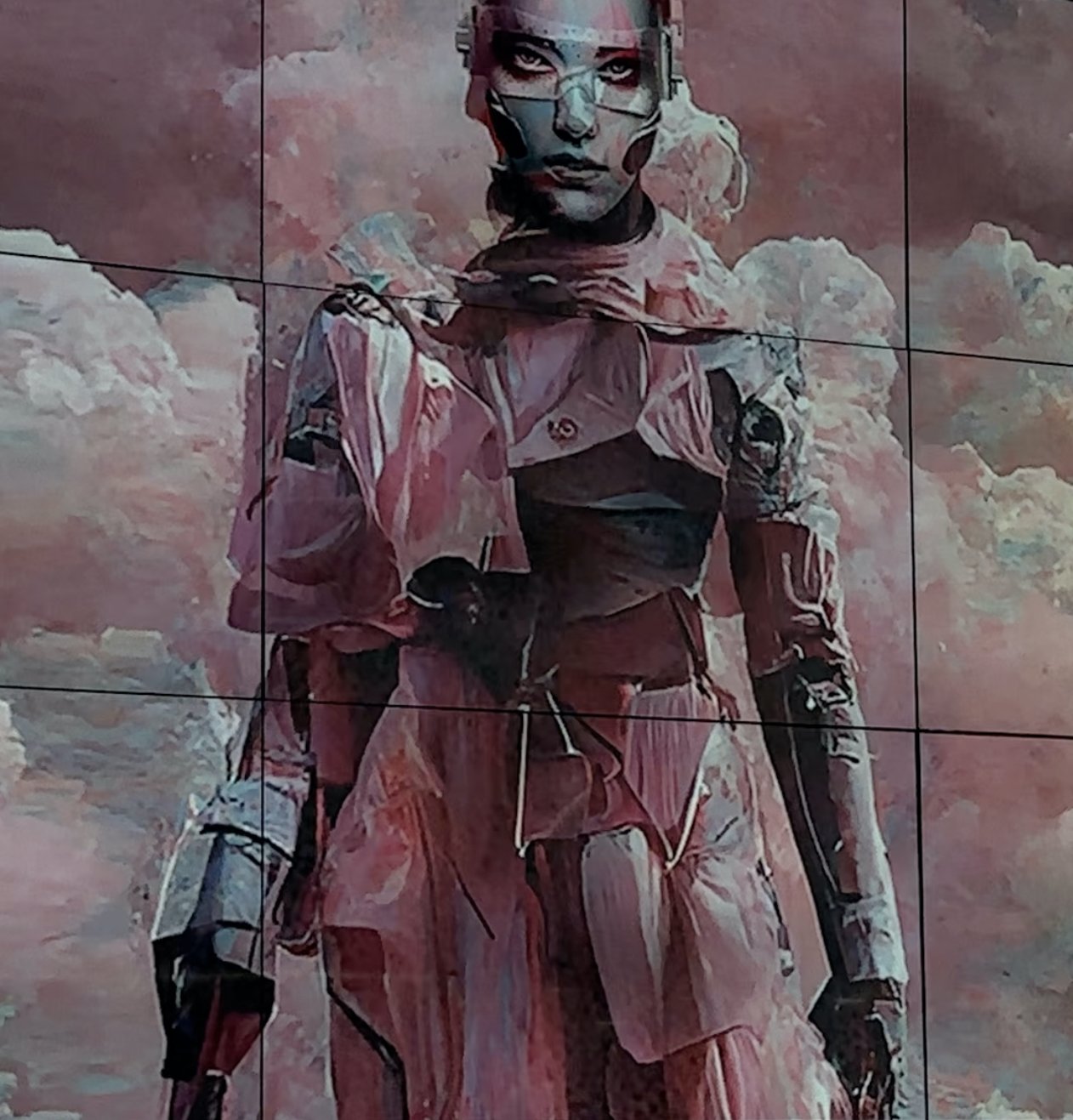Meta Frontier
This month, Epic Games hosted The Fashionverse in their London Innovation Lab, alongside physical shows at London Fashion Week, intending to continue to showcase digital talent worldwide. The highly interactive space featured a built-in Metaverse stage that streamed everything into Decentraland, Spatial, and Pixel Canvas. Other activations included a VR space installed by Placebo, as well as photo booths provided by Zero10. After downloading the application and with the help of augmented reality, guests were able to mirror themselves while trying on virtual garments from various digital designers, as well as top fashion brands like Dior, Louis Vuitton, Dolce & Gabbana, and Loewe, who were created in partnership with Vogue CS.
Maya ES 3D Couture Artist
During this edition of Digital Fashion Week London, views on data ownership, body language in the virtual space, freedom of expression, and the evolving role of social media as communities in the Metaverse are getting stronger and stronger were expressed.
Sasha Tityanko, CEO and Art Director of Sensoriom Galaxy, joined the event via Zoom and delivered an insightful talk about the future of digital interaction in the entertainment and fashion industries. She discussed the digital social interaction of virtual beings and the freedom of expression within the digital space, where anyone has the power to choose to be whoever they wish to be. Utilising AI technology, Sensoriom Galaxy hosts 24/7 format events that are collective parties with performances by virtual artists, while events with big names like David Guetta, Carl Cox, or Black Coffee are still in development to be released later in the year. Users can access them in VR format, in 2D format, and on their mobile devices, where they can interact with other virtual beings by staging dances with others, choosing fashion items, and customising their looks to attend virtual parties using VR products.
Vogue Snapchat Exhibit - Leigh Maynard
With all the freedom and digital garments created by the artists out there, it would be interesting to understand how the digital world will influence real-life fashion. At the same time, will the digital world influence IRL fashion, and what trends will emerge from it?
"Culture can happen at the intersection of different things so that the audience can intersect with the digital world and fashion or music. It is connected with how people look and feel about themselves," said Sasha Tityanko. She believes that virtual fashion trends are a source of inspiration for artists. As the Metaverse continues to evolve, we will likely see more and more fashion trends emerge from this space. "Some Metaverses tend to reproduce the real-life experience, while some are going into a super-fantastic style. Influences are certainly there on the catwalks from the Metaverse. The creators are following a trend; the medium is different," said Tityanko. An example she mentioned is the virtual red avatar created in Sensorium two years ago that could have served as inspiration for Kanye West's red look for one of his performances and Rihanna's outfit from the Super Bowl.
“Culture can happen at the intersection of different things so that the audience can intersect with the digital world and fashion or music. It is connected with how people look and feel about themselves”
Natasha Zinko AW23 - Jason-LLoyd Evans
During London Fashion Week for AW23 collections, designers such as Acuta Sarca, Lula Laora, Natasha Zinko, Kay Kwok, and Mowalola incorporated futuristic and virtual elements into their aesthetic designs.
A number of great animations from around the world have been screened alongside artists who showcased their creations, serving as a reminder that the digital space can be a utopian or a dystopian world of boundless self-expression. The Drip Boutique offers a selection of these artists' creations for purchase. The platform offers the opportunity to try pieces on any image, dressing them on avatars in any game, viewing them in augmented reality from any location, or even wearing them in the Metaverse.
Another aspect that emerged during the event was that designers launched collections first digitally and then produced the garments in real life. Such an approach is more sustainable and innovative in understanding how audiences will react to a collection and produce what really appeals to the public. Jelizaveta Hagleitner, the creator of Right Direction, adopted this business model and showcased a phygital collection during Digital Fashion Week London. Her conscious approach stays in using surplus fabrics while creating minimal, timeless pieces with clear lines and subtle patterns.
KWK by Kay Kwok AW23 by Maja Smiejkowska
Further on the agenda was Placebo, a Swedish high-end fashion brand that specialises in creating genderless, ageless fashion focusing on meta-activism and diversity as part of their brand ethos. The platform is selling SGI and Skins and announced its first physical collection, which will debut in March.
Additionally, more immersive augmented reality activations are to be explored. Edward Enninful curated the Vogue x Snapchat: Redefining the Body exhibition, open to the public until March 5th on Regent Street, London. Designers like Dior, Richard Quinn, and Stella McCartney embraced the idea, allowing the public to interact and experience fashion regardless of gender, body shape, or colour.
Overall, the future of digital fashion offers endless opportunities and will be an exciting platform to watch. Innovation and experimentation in the fashion and digital sectors continue to shape the industry, already impacting audiences and their daily lives.
Angelescu Studio 3D Artist - Michaela Popa





